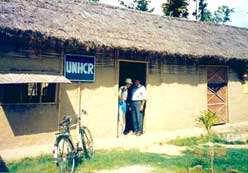 The plot thickens in the 13-year-old Bhutani refugee problem. The focus temporarily shifted from Khudunabari to Geneva in early October for the 54th session of the 64-nation executive committee of UNHCR where Bhutan, Nepal, India and UNHCR spoke their minds.
The plot thickens in the 13-year-old Bhutani refugee problem. The focus temporarily shifted from Khudunabari to Geneva in early October for the 54th session of the 64-nation executive committee of UNHCR where Bhutan, Nepal, India and UNHCR spoke their minds. The statement by UNHCR High Commissioner Ruud Lubbers comforted Bhutan, provoked India to reconfirm its Bhutanese tilt, and once more exposed Nepal's ineptitude and rudderlessness.
While decrying the denial of participation in the joint Bhutani-Nepali process of verification and access to areas of potential return by Bhutan as a "totally unacceptable" situation, Lubbers announced three key measures towards resolution of the refugee problem:
. UNHCR will help Nepal with local integration of those willing to remain and to grant them citizenship.
. Support resettlement initiatives for vulnerable cases.
. Because UNHCR cannot verify the repatriation process, it will not promote returns, and it will gradually phase out its direct involvement in the Jhapa camps.
Lubber's statement was a premature and pre-emptive declaration. He possibly wanted to give an ultimatum both to Bhutan and Nepal and preempt the ongoing negotiations at the ministerial level meeting between Bhutan and Nepal.
But can the UNHCR withdraw unilaterally from its responsibilities towards the refugees in the camps? Its frustration with the negotiation process is understandable. There is compassion fatigue among refugee aid groups. The UNHCR's own budget cuts and diversion of what remains to Iraq and Afghanistan is worrying.
The results of the 15th round reconfirmed the vacillations and double standards of the Nepali government. Whatever it said for public consumption, the truth is that Nepal has steadily surrendered the repatriation rights of refugees. If the host country itself offers local integration then the UNHCR is helpless.
The Nepali representative put on a brave face, and explained that the offer of local integration was not a "stand alone suggestion"-it was for "residual cases" of unwilling returnees. But the Nepali stand was poorly thought through. Bhutan can now pick and choose "real refugees" and determine conditions for their return.
Nepal may also have set an undesirable precedence for itself. What if a forced exodus takes place from northeast India, as has happened in the past?
Bhutan took full advantage of Nepal's ambivalent stand, when its delegate in Geneva expressed "full commitment to the bilateral process". Contrary to everyone's belief, he called it "very complex, and not a typical refugee situation". Why and who factored in matrices of complexity in this otherwise straight-forward case of state repression-led refugee exodus is itself an interesting analytical question.
Bhutan has always tried to retain its distance from the UNHCR, but it must look beyond the offer of local integration. The refugees are Bhutani citizens, and their relocation in Nepal would only reconfirm Thimpu's ethnic cleansing drive. Besides permanently tarnishing its relatively clean image, a festering refugee issue will be politically costly to Bhutan. Once and for all, Thimpu has to do some serious introspection, there has been a lot of negative exposure for Bhutan.
Bhutani officials now admit excesses were committed. The initial enthusiasm with which they defended themselves by ly condemning Lhotsampas as ngolops and agents of 'Greater Nepal' has been abandoned.
Interestingly, India's representative at the UNHCR executive committee meeting in Geneva made a very direct attack on the body's proactive role in putting forward three key measures. India blamed the UNHCR for a "misguided approach" of funding the camps in eastern Nepal, saying this had led to the creation of "vested interest in their perpetuation", and that refugees had a higher standard of living than the local population was itself a source of tension.
While India's provocation is understandable, this highly subjective statement on living conditions in the camp is a mere repetition of Bhutan's decade-old stance. Bhutan always wanted the camps to be quickly dismantled so the world would not be constantly reminded of the eviction of its own citizens.
Anyone visiting the camps in Jhapa will realise how devastating it has been for the refugees. The social indicators are horrendously dismal. A new generation of Bhutanis has grown up in the camps that has never seen the motherland. What are the longterm implications of such social disintegration, the loss of faith through chronic denial of justice?
Doesn't this indicate a sharp erosion of India's large-hearted humanitarian values? The hapless refugees expect India to provide at least an objective view and suggest substantive pathways to make repatriation possible.
The ground reality of the region has been transformed since 1990. The Bhutan, Bengal , Assam, East Nepal quadrangular corridor is becoming the most volatile hotbed of militancy and terrorism in the region. The ability of the involved countries to fight militancy remain highly stretched and diminished.
All this needs fresh and creative thinking among the powers-that-be in each of the countries. Bhutan has to take all its citizens back with full respect and dignity, and this can only be done if the refugees are restored their citizenship, land holdings and politico-cultural rights.
Bhutan will have to constitute a team of independent international observers, even the UNHCR, to transparently monitor the proposed repatriation and rehabilitation process. The refugees now need a total solution, no posturing, no half-measures.
Mahendra P Lama is Professor of South Asian Economies at Jawaharlal Nehru University in New Delhi.


